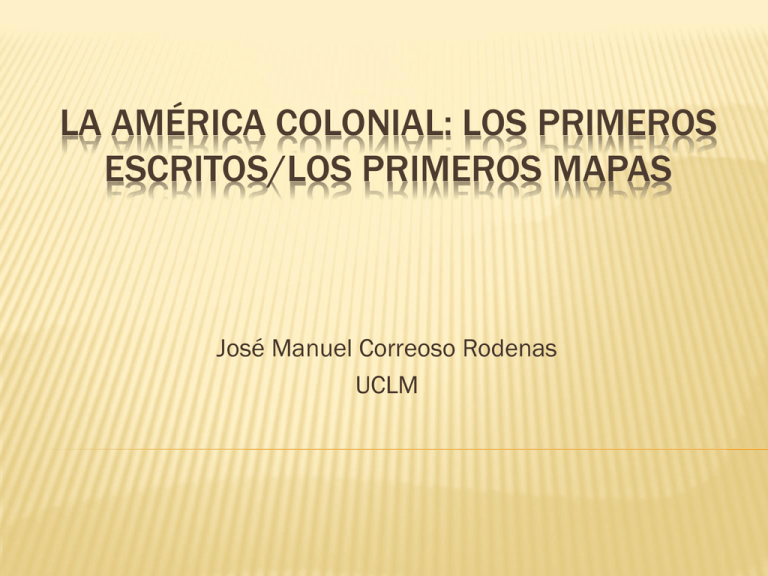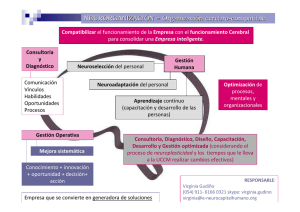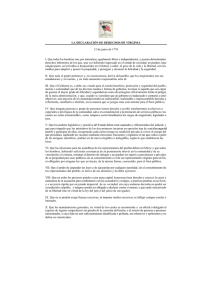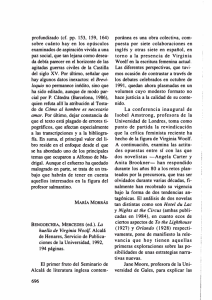La América colonial: los primeros escritos/los primeros mapas
Anuncio

LA AMÉRICA COLONIAL: LOS PRIMEROS ESCRITOS/LOS PRIMEROS MAPAS José Manuel Correoso Rodenas UCLM INTRODUCCIÓN En 1492 se descubre el nuevo continente y, desde ese momento, empiezan a producirse textos y mapas en relación al Nuevo Mundo. - El Diario de Cristóbal Colón es un buen ejemplo de ello. El siglo XVI verá la eclosión de las expediciones europeas y de las primeras misiones de conquista: - Cartas de relación de Hernán Cortés. Primer mapa: Juan de la Cosa, ca. 1500. EXPLORACIÓN DE NORTEAMÉRICA Exploración y asentamiento por parte de varios países europeos (Inglaterra, Francia, España, Holanda, Suecia…). Pequeños asentamientos costeros. Álvar Núñez Cabeza de Vaca: exploración de Florida, estados sureños, Texas y Nuevo México. - Nos deja como testimonio su obra Naufragios (1542, primera obra escrita sobre «Estados Unidos»), donde se narra su periplo, así como una descripción del territorio explorado y las tribus que lo habitaban. Herencia de Cabeza de Vaca en EE.UU.: Bandera de la Cruz de Borgoña (bandera del Imperio español), bandera de Florida y bandera de Alabama. Busto de Cabeza de Vaca en Houston, Texas. EXPLORACIÓN Y ASENTAMIENTOS BRITÁNICOS En la segunda mitad del siglo XVI (período isabelino) se fomenta la navegación y la exploración de los territorios norteamericanos. En 1585 y 1587 se procede a los primeros intentos de colonización (isla de Roanoke), ambos fallidos. - Primeros textos: A Briefe and True Report of the New-Found-Land of Virginia (1588), de Thomas Harriot. 1607: Nueva expedición a Virginia. Fundación de Jamestown, primer asentamiento permanente en Norteamérica. Capitán John Smith: The Generall Historie of Virginia, New-England and the Summer Isles (1624). A partir de este momento, las fundaciones se suceden, por parte de todas las potencias europeas implicadas. «We watered at the Canaries, we traded with the Salvages at Dominica, three weeks we spent […] amongst these Virgin Isles […]. Gone from thence in search of Virginia, the company was not a little discomforted […]. But God the guider of all good actions […] did drive them by his providence to their desired Port […]. The first land they made they called Cape Henry» (SMITH: 1984, p. 43). Plano de Jamestown, ca. 1608. 1620: Llegada del Mayflower a Massachusetts y fundación de la colonia de Plymouth. - William Bradford: Of Plymouth Plantation (1622). Introducción de los puritanos en el Nuevo Mundo. Desde este momento, la colonización británica crecerá de forma exponencial. División del territorio Norte-Sur. «And after wards tooke better view ofthe place, and resolved wher to pitch their dwelling; and the 25 day begane to erecte the first house for commone use to receive them and their goods» (BRADFORD: 1984, p. 70). «Several Gentlemen of the Town and Neighbourhood of Plymouth obtain’d this Grant, with the Ld Chief Justice Popham at their Head» (BYRD: 1984, p. 146). William Byrd II: History of the Dividing Line Betwixt Virginia and North Carolina Run in the Year of our Lord 1728. Descripción de las diferentes colonias británicas en 1728 (posteriores estados). Narración de la formación de las mismas. «[…] all the Coast to the Southward of Chesapeake Bay was called South Virginia, and all to the Northward of it, North Virginia». «In the Year 1630, the famous City of Boston was built, in a Commodious Situation for Trade and Navigation, the same being on a Peninsula at the Bottom of Massachuset Bay». «In like manner New Plymouth joyn’d itself to Massachuset, except only Rhode Island, tho’ of small Extent, got itself erected into a Separate govermment by a Charter from King Charles the 2d, soon after the Restoration, and continues so to this day». «Another Limb lopt off from Virginia was New York, which the Dutch seized very unfairly, on pretence of having Purchased if from Captain Hudson, the first Discoverer. Nor was their way of taking Possesion of it a whit more justifiable then their pretended Title». «But what wounded Virginia deepest was the cutting of MARYLAND from it, by Charter from King Charles the 1st, to sir George Calvert, afterwards Ld Baltimore, bearing date the 20th of June, 1632». «Both the French and the Spaniards had […] long ago taken possesion of […] Carolina; but finding it Produced neither Gold nor Silver, as they greedily expected, and meeting such returns from the Indians as their own Cruelty and Treachery deserved, they totally abandond it». ¿DESCUBRIMIENTO ANTES DEL DESCUBRIMIENTO? BIBLIOGRAFÍA Cartas de Indias. México D.F.: Grupo Editorial Miguel Ángel Porrúa, 2008. AGNEW, John A. y SMITH, Jonathan M. (Eds.): American Space/American Place. Geographies of the Contemporary United States. Edimburgo: Edinburgh University Press, 2002. BERCOVITCH, Sacvan (Ed.): The Cambridge History of American Literature. Volume One: 1590-1820. Cambridge: Cambridge University Press, 1997. HIGH, Peter B.: An Outline of America Literature. Nueva York: Longman, 2010. MANUEL CUENCA, Carme: La literatura de Estados Unidos desde sus orígenes hasta la Primera Guerra Mundial. Madrid: Síntesis, 2006. MORA GONZÁLEZ, Lucía y RIGAL ARAGÓN, Margarita (Eds.): Revisión del canon literario norteamericano: 1607?-1890. Cuenca: Ediciones de la Universidad de Castilla-La Mancha, 2000. RADZINOWICZ, Mary Ann (Ed.): American Colonial Prose. John smith to Thomas Jefferson. Cambridge: Cambridge University Press, 1984.




